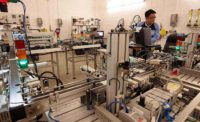Wichita State, NASA Focus on In-Space Manufacturing

A new R&D initiative is developing new processes for in-space manufacturing.
Photo courtesy NASA
WICHITA—Wichita State University is leading a new a three-year project to assist NASA’s manufacturing paradigm shift from “factories on earth” to “factories in space.” Other participants in the initiative include the University of Kansas and Spirit AeroSystems Inc.
“This project will pioneer new in-space manufacturing technology based on electrospinning,” says Wujun Si, Ph.D., assistant professor of industrial, systems and manufacturing engineering at Wichita State. “It will significantly overcome some fundamental challenges faced by the current technology based on additive manufacturing.”
“[We] will use our manufacturing expertise to support the development, characterization and enhancement of nanofiber electrospun membranes in collaboration with the project partners,” adds Kim Caldwell, senior director of global research and technology at Spirit AeroSystems. “This research will make it more feasible to eventually fabricate parts in space factories, enabling new scientific and economic missions.
“The proposed system will facilitate a series of future complex and long duration deep space missions that were previously impossible,” explains Caldwell. “NASA’s launch of Artemis I in 2022 and subsequent Artemis missions demonstrate that in-space manufacturing is of immediate need and essential to enable flexible on-demand manufacturing and mission sustainability.”
In-space manufacturing technology is in an early stage and mostly rooted in additive manufacturing. That’s because the layer-by-layer printing process in additive manufacturing is significantly impacted by the gravity.
According to Si, the new R&D project proposes a new electrospinning-based process. “Compared with additive manufacturing, this electrospinning-based manufacturing paradigm does not rely on gravity and fabricates nanostructured thin parts like functional membranes in space, which complements additive manufacturing that prints macroscale solid parts,” he explains.Looking for a reprint of this article?
From high-res PDFs to custom plaques, order your copy today!






